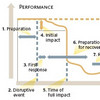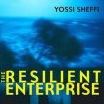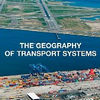 I have always seen myself as a cross-disciplinary thinker, and I guess that is why I am so often sidetracked and led astray by a-maze-ing discoveries when attempting to focus on a subject. But browsing other areas of study and even borrowing ideas from them can be very beneficial. It can shed a different light on things, and at best, help you not to reinvent the wheel. At least that is what James Stock thought in 1997, when he wrote: Applying theories from other disciplines to logistics.
I have always seen myself as a cross-disciplinary thinker, and I guess that is why I am so often sidetracked and led astray by a-maze-ing discoveries when attempting to focus on a subject. But browsing other areas of study and even borrowing ideas from them can be very beneficial. It can shed a different light on things, and at best, help you not to reinvent the wheel. At least that is what James Stock thought in 1997, when he wrote: Applying theories from other disciplines to logistics.
When logistics still was, well, ‘logistics’
Logistics or supply chain management as it is now called is a relatively new science, and was even newer in 1997, the year of today’s article. Then, logistics was still logistics, Cooper Lambert and Pagh had just published their seminal article ‘Supply Chain Management: More Than a New Name for Logistics?’, and most companies were only barely starting to think about global outsourcing and its implications for their own supply chain management. Even the title of the journal the article was published in, International Journal of Physical Distribution & Logistics Management, suggests that logistics at that time was mostly a physical day-to-day operation, not an area were strategic decisions were made. How times have changed…
What disciplines can logistics benefit from?
In his article, Stock lists the following as disciplines that can be used within the realm of logistics:
- accounting
- business/management
- computing
- economics
- marketing
- mathematics
- philosophy
- political science
- psychology
- sociology
He then runs through these disciplines one-by-one, looking at how they have contributed to logistics in the past (if they have) and what new concepts are emerging that can be applied to logistics, or vice versa. It is a very interesting read, and for almost every discipline, Stock lists a number of possible applications:
accounting
- Relating zero-base budgeting to the development of logistics mission statements.
- Development of logistics budgets in international markets where changes can often be rapid and unpredictable.
- Development of specific logistics-related goals and objectives each year that directly tie in to budgetary expenditures for personnel, equipment, etc.
computing
- Development of control programmes for robotics used in various logistics activities.
- Generation of customer databases to be used in segmentation studies, profitability analysis.
economics
- Defining and understanding inter- and intra-firm organizational relationships.
- Developing and maintaining strategic alliances and partnerships with vendors, suppliers and logistics service providers.
- Investigation of the nature and scope of relationships with suppliers.
- Supply chain management issues such as risk sharing, capital outlays, power and conflict between channel intermediaries and the costs and benefits of supply chain integration.
marketing
- JIT and TQM in relationships between companies, suppliers, vendors and customers.
- Identification and classification of types and nature of various logistics relationships.
- Application of constructs (e.g. commitment, communication, co-operation, shared values, trust) used in relationship marketing research to better understand logistics relationships.
philosophy
- Examining existing ethical rules or norms in logistics decision making.
- Development of company policies relating to employee-employee and employee-employer relations, behaviour of employees in relationships with suppliers, vendors, customers and other relevant publics of the firm.
- Examination of the corporate culture in an organization.
political science
- Examining complaining behaviour of customers and the possible actions of customers to service failures of companies.
- Investigation of company-employee relations, especially with respect to employee suggestions and/or criticisms.
- Examination of group behaviour, such as in teams or committees.
psychology
- Examination of logistics research which have grouped companies, organizations, employees, or customers into categories in order to identify the properties or characteristics of each group.
- Inclusion of both qualitative and quantitative research methods/analyses in logistics research.
- Examination of entities in various stages of development to determine degrees of variability in characteristics, inputs and outputs common to firms, departments and individuals in specific stages.
sociology
- Implementation of environmental awareness programmes in packaging design and in warehouses and/or distribution centres (e.g. reverse logistics)
- Employee acceptance of quality programmes, cost-service trade-off strategies, strategic alliances and partnerships and other corporate-wide improvement efforts
- Corporate philosophy that logistics creates customer satisfaction, sustainable competitive advantage and customer loyalty.
Looking back, I think many of these issues have been covered in the literature on supply chain and logistics since 1997, although very few actually cite Stock in their references.
Conclusion
I like mixing ideas, and my approach to logistics, or supply chain management is no exception (Being an intersectionist, as I explained yesterday, I better keep these two terms separate from each other). This mixture of ideas is what I first tried in my 2004 philosophical essay on Transportation Reliability and Vulnerability, where I in the end concluded with feeling a certain kinship with Giordano Bruno, and perhaps it is time to refresh what I wrote back then (excerpt only):
Giordano Bruno was a philosopher who took the current ideas of his time and extrapolated them to new and original vistas. He claimed that all matter was intimately linked to all other matter, that we live in a universe in which all things are related. Nothing could be more true of the global supply chains of our days.
Giordano Bruno is unique compared to the other martyrs of his time because of the power of his forward-thinking, where others were personal-thinking or contrary-thinking. Bruno advocated the use of conceptualizing, that is to think in terms of images. He said that to think was to speculate with images. Complex scientific correlations are often better explained in pictures than in mathematical formulae. Consequently, Bruno was able to rationalize his theories, even though he used no mathematics. Rather than spinning his ideas from the yarn of algebra, the cobweb of modern science, Bruno molded pictures and manipulated visual images to interpret complex ideas.
(Read the full passage about Giordano Bruno)
Following Bruno’s lead, leaving the mathematical world of economics and hard-fact decisions in logistics and supply chain management behind, the research that is to follow on this blog intends in every way to be rich in images, but poor in formulas.
Reference
Stock, J. (1997). Applying theories from other disciplines to logistics International Journal of Physical Distribution & Logistics Management, 27 (9/10), 515-539 DOI: 10.1108/09600039710188576
Links
- linkedin.com: James Stock












